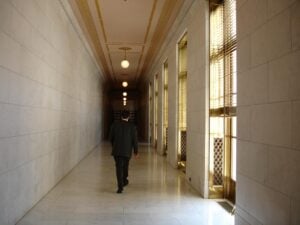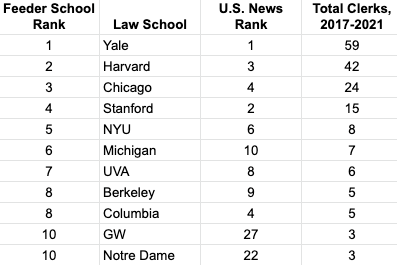Supreme Court Clerk Hiring Watch: Feeder Judges, Courts, And Law Schools, 2017-2021
If you aspire to clerk for SCOTUS, or even if you're just curious, there's lots of interesting info here.

At the U.S. Supreme Court (photo by David Lat).
Ed. note: This column originally appeared on Original Jurisdiction, the latest Substack publication from David Lat. You can learn more about Original Jurisdiction on its About page, and you can subscribe through this signup page.
As I mentioned previously, this month is “Supreme Court Clerk Month” here at Original Jurisdiction. I’m going to publish a series of stories about SCOTUS clerkships and clerks, looking at these subjects from a number of different angles.[1]

The Business Case For AI At Your Law Firm

First up: rankings of the law schools, feeder judges, and lower courts that have produced the most SCOTUS clerks over the past five Terms (i.e., October Term 2017 through and including October Term 2021, whose clerks are now hard at work). Let’s start with the top ten law schools—actually eleven, since there’s a tie for tenth place:
Yale, the #1 law school in the U.S. News rankings, is also the top law school in minting Supreme Court clerk clerks—by a large margin. YLS has around 200 students per J.D. class year, compared to 500 or so for second-place Harvard, so if you control for class size, the gap between YLS and HLS is much bigger than what you see here. As for Chicago Law, its class size is close to that of Yale’s—and even a bit smaller, at just under 200 students per year—but YLS still produces more than twice as many SCOTUS clerks as Chicago.
It’s interesting to see which law schools outperform or underperform their U.S. News rank when it comes to generating SCOTUS clerks. The top four clerk-producing schools are also the top four U.S. News schools, but the order is different, with Chicago coming in ahead of Stanford (which was certainly my sense from anecdotal observation, which the data confirms).
Sponsored

How Transactional Lawyers Can Better Serve (And Maintain) Their Clients

Law Firms Now Have A Choice In Their Document Comparison Software

Generative AI In Legal Work — What’s Fact And What’s Fiction?


Law Firms Now Have A Choice In Their Document Comparison Software
Five other schools in the so-called top-14 or “T14” schools—NYU, Michigan, UVA, Berkeley, and Columbia—are also in the top ten for SCOTUS clerks. But again, it’s interesting to note which schools outperform their rank. I’ve always thought of UVA as a great school for aspiring clerks, but it’s actually Michigan that outperforms its U.S. News rank the most.
NYU and Columbia, the two top New York City schools, are frequently compared with each other, and they’re definitely rivals. When it comes to producing SCOTUS clerks, NYU currently has the edge. But query whether this will stay the same; I hear through the grapevine that CLS is working on upping its game when it comes to sending students into clerkships, including SCOTUS clerkships.
Which five law schools in the T14 of U.S. News are not among the top schools for SCOTUS clerkships? Those would be Penn/Carey (#6 in U.S. News), Duke (#10), Northwestern (#12), Cornell (#13), and Georgetown (currently #15 in U.S. News, behind UCLA at #14—but for most of the history of the rankings, #14).[2]
Which law schools outside the T14 are top ten when it comes to SCOTUS clerks? George Washington (GW) and Notre Dame. As for why, I think that both GW and Notre Dame benefit from the high number of former SCOTUS clerks they have on their faculties, who can make personal recommendations to the justices for whom they clerked or other justices they happen to know.[3]
Continue reading over at Original Jurisdiction.
Sponsored

The Business Case For AI At Your Law Firm


AI’s Impact On Law Firms Of Every Size

[1] Most readers of this publication understand the desirability and prestige of Supreme Court clerkships and the important role that clerks play in helping the justices go about their work, so I won’t belabor that here. But there’s no shortage of online commentary for those of you who would like to learn more (e.g., this somewhat tongue-in-cheek post from Underneath Their Robes).
[2] I’d say that a law school’s success at producing SCOTUS clerks is generally a function of two things: the caliber of its student body, and the interest of its students in opportunities like SCOTUS clerkships. The second factor might explain why Chicago does better than Stanford at generating SCOTUS clerks; Stanford law students are no less brilliant than their Chicago counterparts, but the SLS folks might be more interested in the startup and tech scenes than the D.C. power scene. Similarly, student interest might explain why Penn, #6 in U.S. News, isn’t a top SCOTUS clerk school; perhaps its business-minded graduates (holla, Wharton) prefer to go straight into Biglaw (but maybe that is changing).
[3] In this particular data set, we don’t (yet) have Justice Amy Coney Barrett hiring from Notre Dame, her alma mater—but I wouldn’t be surprised to see that in the years ahead. Also, this data set doesn’t reflect Justice Antonin Scalia’s history of hiring Notre Dame alumni (e.g., Amy Coney Barrett)—but look for that in the data from the past ten Terms that I’ll post later.
David Lat , the founding editor of Above the Law, is a writer and speaker about law and legal affairs. You can read his latest writing about law and the legal profession by subscribing to Original Jurisdiction, his Substack newsletter. David’s book, Supreme Ambitions: A Novel (2014), was described by the New York Times as “the most buzzed-about novel of the year” among legal elites. Before entering the media and recruiting worlds, David worked as a federal prosecutor, a litigation associate at Wachtell Lipton, and a law clerk to Judge Diarmuid F. O’Scannlain of the U.S. Court of Appeals for the Ninth Circuit. You can connect with David on Twitter (@DavidLat), LinkedIn, and Facebook, and you can reach him by email at davidlat@substack.com.
, the founding editor of Above the Law, is a writer and speaker about law and legal affairs. You can read his latest writing about law and the legal profession by subscribing to Original Jurisdiction, his Substack newsletter. David’s book, Supreme Ambitions: A Novel (2014), was described by the New York Times as “the most buzzed-about novel of the year” among legal elites. Before entering the media and recruiting worlds, David worked as a federal prosecutor, a litigation associate at Wachtell Lipton, and a law clerk to Judge Diarmuid F. O’Scannlain of the U.S. Court of Appeals for the Ninth Circuit. You can connect with David on Twitter (@DavidLat), LinkedIn, and Facebook, and you can reach him by email at davidlat@substack.com.








